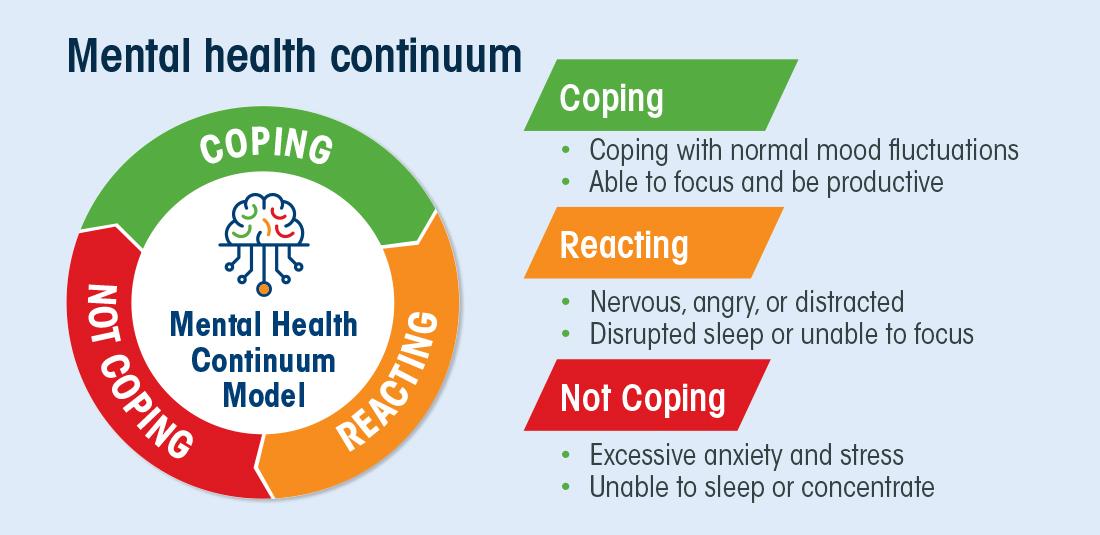Your mental health responsibilities at work
Mental health problems can be common at work so understanding your mental health responsibilities is very important.
COVID-19 and mental health
We understand that mental health is especially important during COVID-19. Visit our COVID-19 page for resources we have developed to assist employers and employees with mental health at work.
Mental health explained
Mental health is a level of wellbeing where people can cope with ordinary work and life pressures.
Mental health exists on a continuum from coping to not coping, affecting how people think, feel, and act in everyday life.
Coping
- Coping with normal mood fluctuations
- Able to focus and be productive
Reacting
- Nervous, angry or distracted
- Disrupted sleep or unable to focus
Not coping
- Expressive anxiety and stress
- Unable to sleep or concentrate

In the workplace we know that good work is good for our mental health and wellbeing. A healthy and safe workplace provides structure and purpose, a sense of identity, and opportunities to develop skills and increased feelings of self-worth.
Workplace mental health statistics
- 1 in 5 Australian workers have a mental health condition
- Poor mental health costs Australian businesses $11 billion per year
- Every $1 invested in a mentally healthy workplace has a Return on Investment of $2.30.
Roles and responsibilities at work
Everyone has a responsibility in the workplace to:
- Reasonably comply with health and safety instructions
- Take reasonable care of their own mental health
- Take reasonable care that their actions do not adversely affect the health and safety of other people.
The Work Health and Safety Act 2011 also defines clear duties for roles within workplaces.
Employees and other workers
Workers and other people at the workplace have a duty to co-operate with any reasonable policy or procedure issued by the 'person conducting a business or undertaking' (PCBU) and must take all reasonable care for their own health and safety.
See more information:
Senior managers and executives
Senior managers and executives, as officers under work health and safety legislation, have a duty to exercise due diligence to ensure that the 'person conducting a business or undertaking' (PCBU) has systems and procedures in place to meet its work health and safety obligations.
See more information:
Employers and PCBUs
The Work Health and Safety Act 2011 (WHS Act) imposes a ‘primary’ duty on the 'person conducting a business or undertaking' (PCBU) to ensure the physical and psychological health and safety of its workers and other people, so far as reasonably practicable.
See more information on the roles and responsibilities of the PCBU.
A systematic approach to workplace mental health
Psychosocial hazards are aspects of work which have the potential to cause psychological or physical harm. These can include, but are not limited to, bullying, fatigue, stress, remote work and poorly managed organisational change.
Officers under the Work Health and Safety Act 2011 (WHS Act), have a key role to play in creating a systematic approach to the prevention and management of these hazards in the workplace. This is known as ‘due diligence’ which includes taking reasonable steps to undertake the following actions.
- Acquire knowledge of health and safety matters
- Understand operations and associated hazards and risks
- Ensure resources and processes are in place to eliminate or minimise risks
- Ensure there is a process for timely information and response to incidents, hazards and risks
- Ensure there are appropriate processes for complying with any duties under the WHS Act, such as consultation
- Verify the provision and use of resources and processes.
Blueprint for mentally healthy workplaces
The Blueprint for Mentally Health Workplaces outlines core pillars and principles underpinning a nationally consistent approach to mentally healthy workplaces. It was produced as part of the National Workplace Initiative, a collaborative project of the Mentally Healthy Workplace Alliance, of which Comcare is a member.